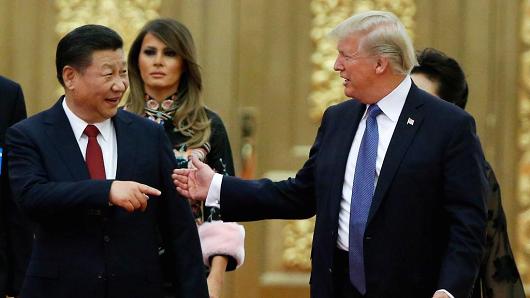
Thomas Peter | Pool | Getty Images
U.S. President Donald Trump and China’s President Xi Jinping arrive at a state dinner in China on November 9, 2017.
Signs that the bull market in stocks has gone global for good are everywhere.
Harvard economics professor Kenneth Rogoff said this week that right now “is the best moment in the global economy since the ’50s.”
As of Friday, more than $61 billion had flowed into the U.S. ETF industry, which would smash the monthly record set after Trump’s election. And a lot of that action continues to be U.S. stock bets.
But in January there also have been massive flows into developed markets and emerging markets equity ETFs and traditional global mutual funds, according to preliminary TrimTabs data for the month. Inflows of near-$30 billion into overseas ETFs puts it on pace for the second-highest month in two-and-a-half years. In traditional mutual funds, the roughly $15 billion into global portfolios in January is the most since July 2015.
By many technical and sentiment indicators, all this market buying is signaling “Sell!” — whether it be a sell on stocks or a sell on bonds.
“People are just embracing risks,” said Winston Chua, TrimTabs analyst.
People are also chasing performance. Last year overseas markets, both in the developed world and emerging world, did better than the S&P 500.
But wealthier investors who manage their own market money are also showing a subtle focus on valuation that’s leading them to like overseas stocks, according to the results of an E-Trade Financial survey.
Ninety-one percent of investors who have more than $1 million in brokerage accounts rated the U.S. economy at an A or B in the first quarter, the highest level ever recorded by the E-Trade survey, provided exclusively to CNBC. The percentage of these investors who grade the U.S. economy at an A increased from 8 percent in the fourth quarter last year to 24 percent in January. Eighty-one percent also think the economy is healthy enough for additional Fed rate hikes, up from 67 percent in Q4 2017.
 EU News Digest Latest News & Updates
EU News Digest Latest News & Updates



